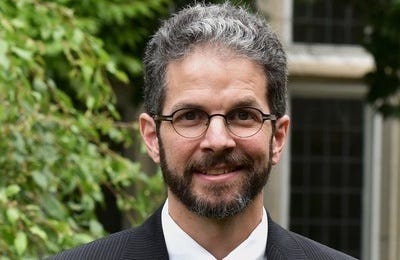Divine Right
FreeCons and NatCons differ on religious liberty and social order
When leaders from across America’s conservative movement came together last year to draft and sign the Freedom Conservatism Statement of Principles, we chose not to cite any particular religious tradition as its starting point.
That wasn’t because FreeCons are hostile to religious beliefs or institutions. Far from it. Most are Christians, Jews, or adherents of other faiths.
And as we explain in the “About” section of our site, most signatories “agree that societies are unlikely to remain healthy and free unless there is a widespread belief in God or some transcendent moral order.”
In building our community and drafting our statement, however, we opted for breadth.
Whatever their religious beliefs and practices, all Americans committed to individual liberty, free enterprise, constitutional government, decentralization, strong families, and a robust civil society must be welcome in a conservative movement that aspires to lead and govern our great country.
Moreover, if we had attempted to synthesize the varying religious beliefs of Freedom Conservatives, that would yield a “common denominator” statement offering only a thin and unsatisfying slice of what is, for most, a thick layer of meaning.
Some critics continue to express their dissatisfaction with our decision. Today we feature the work of three writers who explore these issues in greater detail.
Whose faith is authentic?
John Colman is professor of politics and director of the honors program at Ave Marie University, a Catholic university based in Florida. He is also a FreeCon signatory.
A scholar of classical thought and the Founding era, Colman is the author of Everyone Orthodoxy to Themselves: John Locke and his American Students on Religion and Liberal Society (2023) and Lucretius as Theorist of Political Life (2012).
In an essay for the AIER magazine FUSION, he compared the Freedom Conservatism statement to the earlier National Conservatism Statement of Principles, which argued that no nation “can long endure without humility and gratitude before God and fear of his judgment that are found in authentic religious tradition.”
What do NatCons consider to be within America’s “authentic” religious tradition, Colman asked. Mormons? Charismatic Christians? What about the millions of Americans today who follow Islam?
“Under a broad definition,” he wrote, the NatCon statement is “plausible but anodyne. On a narrow one, it is contentious and risks excluding even active members of the conservative coalition, as well as relative newcomers to public discourse.”
Given renewed threats to American liberties by a rising tide of illiberalism and incivility, it’s understandable why some conservatives believe government ought to enact policies aimed at establishing and maintain religious consensus.
But such policies would necessarily bring “a significant expansion of federal authority over the lives and minds of citizens,” Colman concluded.
“Freedom Conservatism’s understanding of freedom of conscience as the right to ‘say and think what one believes to be true,’ is a stand in defense of what Madison call the most ‘sacred of all property’ we possess — the free use of our mind, the choice of objects upon which to employ it, in our opinions, and the free communication of them.”
Morality and free choice
John Pinheiro is director of research at the Acton Institute was the founding director of Catholic studies at Aquinas College.
He is the author of the award-winning Missionaries of Republicanism: A Religious History of the Mexican-American War (2014), James K. Polk and Civil-Military Relations during the Mexican War (2007), and The American Experiment in Ordered Liberty (2019).
In a Law & Liberty review, Pinheiro also contrasted the principles present in the FreeCon statement with recent calls to organize conservatism around a political establishment of religion.
Sebastian Morello’s Conservatism and Grace: The Conservative Case for Religion by Establishment, for example, explores these issues in great detail.
While commending the author’s scholarship and “convincing case for religion’s indelible connection to culture and therefore to the conservative impulse to preserve the ‘permanent things,’” Pinheiro disagrees that government policies to “establish” religion follow logically from Morello’s argument.
“Establishmentarianism fails on practical grounds, chips away at human dignity, and downplays the truth that virtuous acts require freedom in order to be virtuous,” Pinheiro writes.
“Religious liberty assists the development of virtue because moral choices must be free choices. The connection of freedom to virtue, and virtue to religion, is especially important to free societies and highlights the connection of religious liberty to political and economic liberty.”
Political gospel
John G. Grove is managing editor of Liberty Fund’s journal Law & Liberty, where he offered a “friendly critique” of Freedom Conservatism last summer.
Prior to joining Liberty Fund, he was associate professor of political science at Lincoln Memorial University. Grove is the author of John C. Calhoun’s Theory of Republicanism (2016) and has published academic and non-academic work in Polity, American Political Thought, National Affairs, The American Conservative, and other outlets.
In a recent article for Religion & Liberty, Grove also analyzed the NatCon statement’s endorsement of “public religion” and its implications.
“In more ways than one,” he wrote, “the devil is in the details. Big-picture talk of public religion avoids the question of the particular tasks of church and state and the value of each performing what is distinctive to it.”
Because of America’s diverse array of denominations — true at the Founding and even more true today — government establishment of a public religion would almost certainly have to proceed “without any particular confession,” a prospect that troubles Grove.
“In contemporary circumstances, a consciously manufactured public religion would therefore do the opposite of what the old establishments in theory aimed at: rather than point subjects to a stable, orthodox Church as guardian of religious truth, hoping merely to glean the beneficial side effects of genuine religious unity, it would appeal to citizens with a contrived political gospel masquerading as Christianity.
“And given America’s sectarian diversity, this political gospel — preached from state capitols, debate stages, talk shows, and government schools — would have a far more prominent and influential platform than any given church that was mostly focused on the eternal souls of those in its pews.
“To the extent that such a public religion is pervasive and influential, the churches would have every incentive to conform their messages to it. The state would not be supporting ‘the Church’ as a source of truth that transcends our earthly politics, but rather the many American churches would be led along by the politicians.”
Grove concluded that “whether directed more by conservatives or more by progressives, this sort of public faith that emerges from the politics of the modern nation-state will always a be human concoction, and it will always be the responsibility of the Church to call out such pretensions as it does all false gods.”
In a separate review of Patrick Deneen’s Regime Change for The University Bookman, Grove observed that the “appeal to the present populist moment without giving up on his belief that the right kind of elites can impose a preconceived social order on the world.”



